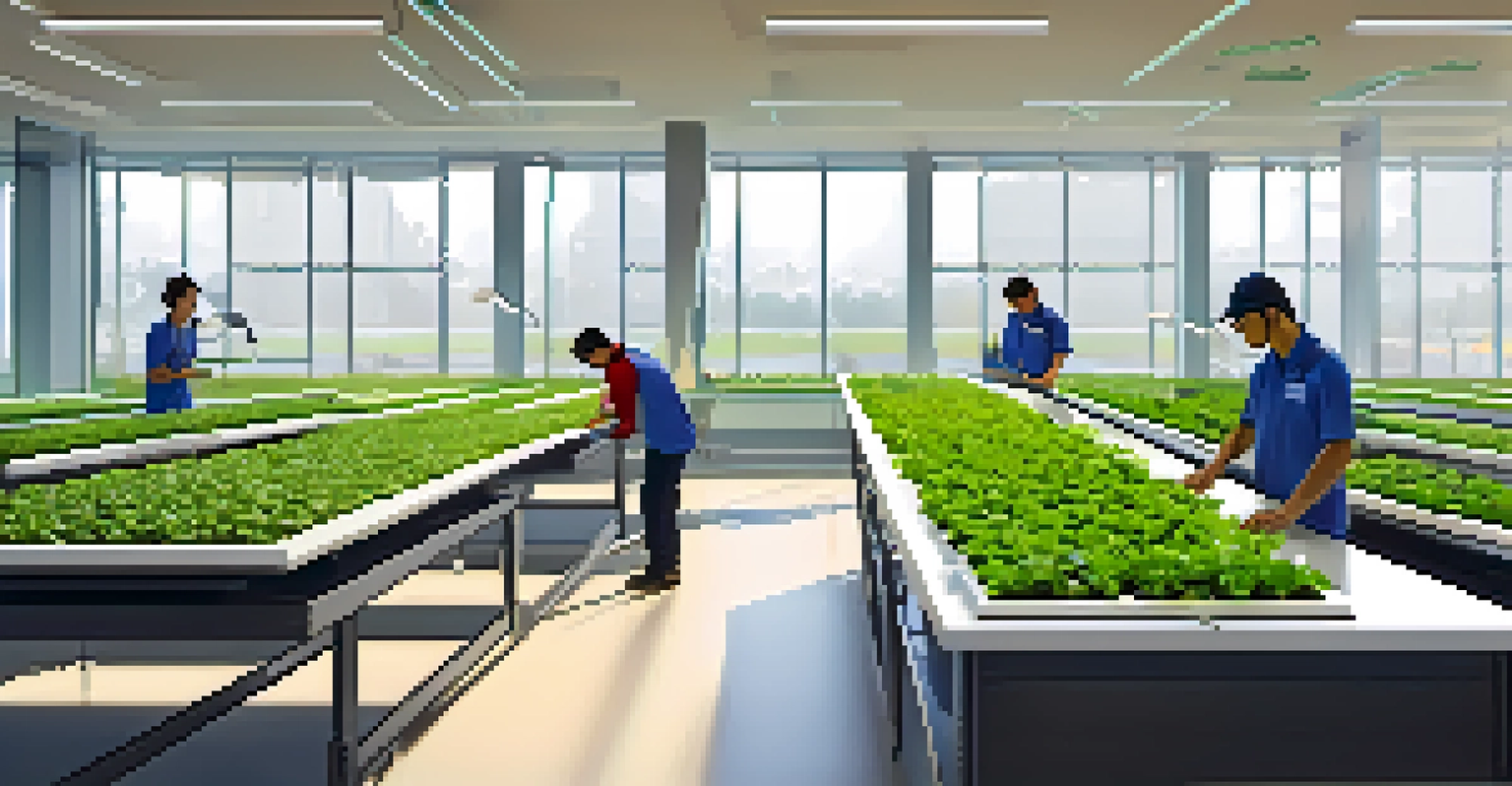Agricultural Education at NC State: Shaping Future Farmers

The Importance of Agricultural Education Today
Agricultural education plays a crucial role in addressing global food security. As the population grows, so does the need for sustainable farming practices and innovative agricultural techniques. This educational foundation not only prepares students for careers in farming but also equips them with the knowledge to tackle pressing environmental challenges.
The future of agriculture is not just about producing more food, but about producing it sustainably and responsibly.
At NC State, the focus is on developing a curriculum that is both practical and relevant. Students learn not just the science of agriculture but also the business acumen required to thrive in a competitive marketplace. This comprehensive approach ensures graduates are well-rounded and ready to make an impact in their communities and beyond.
Moreover, agricultural education fosters a connection between students and the land. By engaging with real-world farming experiences, students cultivate a sense of responsibility toward natural resources. This hands-on learning is vital for nurturing the next generation of informed and passionate farmers.
Innovative Programs Offered at NC State
NC State offers a variety of innovative programs that cater to diverse interests in agriculture. From sustainable crop production to precision agriculture technology, students can tailor their education to suit their career goals. This flexibility is key in an industry that is constantly evolving with new technologies and methods.

One standout program is the Agricultural Institute, which combines classroom learning with extensive fieldwork. This immersive experience allows students to apply their knowledge in real-world scenarios, enhancing their problem-solving skills and boosting their confidence. Such practical training is invaluable in preparing them for future challenges in agriculture.
Hands-On Learning in Agriculture
NC State emphasizes practical education, enabling students to engage directly with farming and develop essential skills for real-world challenges.
Additionally, NC State emphasizes interdisciplinary learning, encouraging collaboration between agriculture and other fields. For instance, students can explore the intersection of agriculture and environmental science, leading to innovative solutions that benefit both sectors. This holistic approach ensures that graduates are not only skilled farmers but also informed stewards of the environment.
Research Opportunities in Agricultural Education
Research is a cornerstone of agricultural education at NC State, driving innovation and enhancing learning. Students have the chance to participate in cutting-edge research projects that address real-world agricultural issues. This involvement not only enriches their understanding but also contributes to the advancement of the industry as a whole.
Education is the most powerful weapon which you can use to change the world.
The university's research facilities are equipped with state-of-the-art technology, enabling students to explore various aspects of agriculture. Whether it's studying crop genetics or developing sustainable pest management strategies, the opportunities are vast. Such hands-on research experience is a significant advantage for students entering the workforce.
Furthermore, collaboration with faculty members on research projects fosters mentorship relationships. These connections provide students with invaluable insights and guidance as they navigate their careers. By engaging in research, students also develop critical thinking and analytical skills that are essential for success in any agricultural profession.
Community Engagement and Outreach Programs
NC State places a strong emphasis on community engagement, recognizing the importance of connecting students with local farmers and agricultural organizations. Through outreach programs, students gain firsthand experience and insight into the challenges faced by farmers in their communities. This connection not only enhances their education but also fosters a sense of responsibility toward local agricultural issues.
One notable initiative is the NC State Extension program, which provides resources and support to farmers across the state. Students often participate in workshops and outreach events, sharing their knowledge and helping to implement best practices. This reciprocal relationship benefits both students and the farming community, creating a culture of collaboration and mutual growth.
Innovative Programs and Research
The university offers diverse programs and cutting-edge research opportunities, allowing students to explore new agricultural technologies and solutions.
Additionally, community engagement initiatives often involve service-learning projects that address food insecurity and promote sustainable practices. By working directly with community members, students gain a deeper understanding of the social dimensions of agriculture. This holistic approach ensures that future farmers are not only skilled practitioners but also compassionate leaders in their fields.
The Role of Technology in Agricultural Education
Technology is rapidly transforming the agricultural landscape, and NC State is at the forefront of this evolution. The integration of advanced technologies such as drone imaging, precision agriculture tools, and data analytics is essential for modern farming practices. Students are trained to leverage these tools, preparing them for a tech-savvy agricultural industry.
Courses focused on agricultural technologies equip students with the skills needed to collect and analyze data effectively. This data-driven approach helps farmers make informed decisions, optimize resource use, and increase efficiency. By embracing technology, students learn to adapt to the changing demands of the agricultural sector.
Moreover, the university regularly collaborates with industry partners to ensure that the curriculum remains up to date with current technological advancements. These partnerships provide students with access to the latest tools and practices, enhancing their learning experience. As a result, graduates are well-prepared to lead the way in innovative agricultural solutions.
Building Leadership Skills for Future Farmers
Leadership is a critical component of agricultural education at NC State. The university encourages students to develop not only their technical skills but also their ability to lead and inspire others. Through various programs and activities, students learn the importance of effective communication, teamwork, and problem-solving.
Participating in student organizations, such as the Future Farmers of America (FFA), allows students to hone their leadership skills in a supportive environment. These organizations provide opportunities for networking, public speaking, and community service, all vital for future leaders in agriculture. Engaging with peers who share a passion for farming fosters camaraderie and collaboration.
Community Engagement and Leadership
NC State fosters community connections and leadership skills through outreach programs, preparing students to be responsible agricultural leaders.
Additionally, mentorship programs connect students with industry professionals, providing guidance and insight into leadership roles within the agricultural sector. These relationships help students understand the qualities that make effective leaders and inspire them to take on leadership positions in their future careers. By focusing on leadership development, NC State empowers students to become influential advocates for the agricultural community.
Alumni Success Stories: Impacting Agriculture
The success of NC State's agricultural education program is reflected in the achievements of its alumni. Graduates have gone on to make significant contributions to the agricultural industry, from innovative farming practices to leadership roles in agribusiness. Their accomplishments serve as an inspiration for current students and demonstrate the value of a solid educational foundation.
One notable alum is a recent graduate who started a sustainable farming operation that has gained national recognition. By applying the principles learned at NC State, they have successfully integrated technology and eco-friendly practices into their business model. This success story highlights the potential for graduates to create positive change in the agriculture sector.

Moreover, many alumni actively engage with the university, offering mentorship and support to current students. This ongoing relationship fosters a sense of community and continuity within the program. As alumni continue to excel in their fields, they contribute to a legacy of excellence that shapes the future of agriculture.